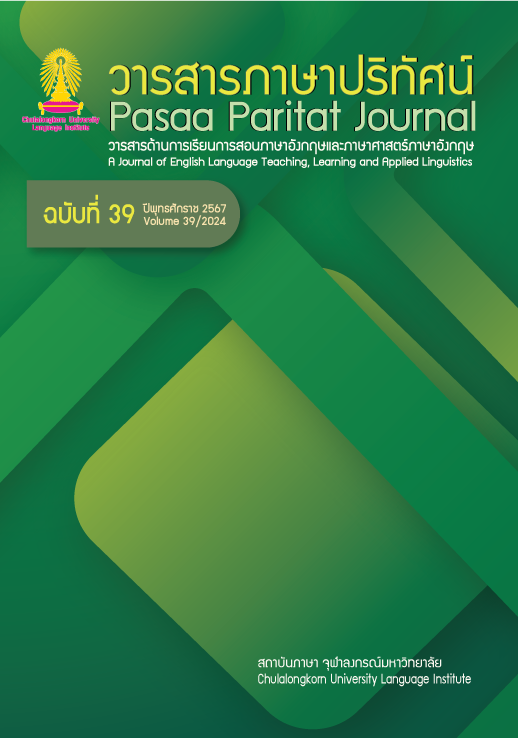The Effects of a Combination of Genre Analysis and Genre-Based Writing Teaching on Enhancement of Thai EFL Learners’ Argumentative Writing Proficiency
DOI:
https://doi.org/10.58837/CHULA.PPJ.39.11Keywords:
genre analysis, genre-based writing teaching, argumentative writing, writing proficiency, EFL learnersAbstract
As many learners struggle to develop their academic writing proficiency, researchers and scholars have proposed a myriad of teaching methods to help learners achieve their goal. The present study investigated the effects of a combination of genre analysis and genre-based teaching on the enhancement of argumentative writing proficiency of ten Thai final-year secondary school (Mathayomsusksa 6) EFL learners. In this study, the linguistic features and move structures of 33 argumentative essay samples purposively selected from Cambridge IELTS Preparation Books (Volumes 1-16) were analyzed using genre analysis (Swales, 1990) before the analysis results were incorporated into a 13-week period of argumentative writing instruction. A pre-test, immediate post-test, and delayed post-test were employed to yield quantitative data of gains in scores, while learners’ journals and semi-structured interviews provided qualitative data regarding learners’ argumentative writing. The findings of the study offer further empirical evidence that when genre analysis and genre-based writing teaching are combined into an instructional model, significant improvement in argumentative writing becomes apparent.
References
Banks, T. (2012). Writing for impact: Cambridge writing business skill. Cambridge University Press.
Bhatia, V. K. (2016). Critical genre analysis: Investigating interdiscursive performance in professional practice. Routledge.
Cambridge Assessment English. (2019). Comparing scores to IELTS. Cambridge University Press.
Cambridge University Press. (2007). Cambridge IELTS 6. Cambridge University Press.
Cambridge University Press. (2009). Cambridge IELTS 8. Cambridge University Press.
Cambridge University Press. (2015). Cambridge IELTS 14. Cambridge University Press.
Cheng, A. (2006). Understanding learners and learning in ESP genre-based writing instruction. English for Specific Purposes, 25(1), 76–89. https://doi.org/10.1016/j.esp.2005.07.002
Cohen, J. (1988). Statistical power analysis for the behavioral sciences (2nd ed.). Lawrence Erlbaum Associates.
Creswell, J. (2015). Educational research: Planning, conducting, and evaluating quantitative and qualitative research. Pearson.
Dickinson, P. (2013). A genre-based approach to preparing IELTS and TOEFL essay writing tasks. Journal of Niigata University of International and Information Studies, 16, 1–9.
Dimond-Bayir, S. (2014). Writing for IELTS. Macmillan.
Flowerdew, J. (2013). Discourse in English language education. Routledge.
Halim, N. (2019). Incorporating genre analysis in teaching writing. Getsempena English Education Journal, 6(1), 148–158. https://doi.org/10.46244/geej.v6i1.872
Herman, Purba, R., Thao, N. V., & Purba, A. (2020). Using genre-based approach to overcome students’ difficulties in writing. Journal of Education and e-Learning Research, 7(4), 464–470. https://doi.org/10.20448/journal.509.2020.74.464.470
Hyland, K. (2004). Genre and second language writing. University of Michigan Press.
Hyland, K. (2015). Teaching and researching writing. Routledge.
Ka-Kan-Dee, M. (2015). Analyzing EFL students' argumentative writing difficulties and teaching strategies employed by lecturers in selected universities in Thailand [Doctoral dissertation, Universiti Sains Malaysia]. http://eprints.usm.my/31890/1/Maleerat_Ka-Kan-Dee_(HJ).pdf
Lui, F. (2012). Genre analysis of American presidential inaugural speech. Theory & Practice in Language Studies, 2(11), 2407–2411. https://doi.org/10.4304/tpls.2.11.2407-2411
Oghyanous, P. A., & Bakhtiarvand, M. (2024). Genre-based instruction and Iranian EFL learners’ argumentative essay writing: Performance, structure, perceptions, and authorial identity in focus. Randwick International of Education and Linguistics Science Journal, 5(1), 35–53. https://doi.org/10.47175/rielsj.v5i1.934
Rahman, M. M. (2011). Genre-based writing instruction: Implications in ESP classroom. English for Specific Purposes World, 33(11), 1–9.
Saenkhum, T. (2019). English writing instruction and teacher preparation in Thailand: Perspectives from the primary and secondary schools. In L. Seloni & S. H. Lee (Eds.), Second language writing instruction in global contexts: English language teacher preparation and development (pp. 111–130). Multilingual Matters. https://doi.org/10.21832/9781788925877-010
Sari, D. M. M. (2019). An overview of genre-based approach in EFL writing class. Journal of English Education (JournE), 1(1), 31–40.
Smith, C. D., Worsfold, K., Davies, L., Fisher, R., & McPhail, R. (2014). Assessment literacy and student learning: The case for explicitly developing students’ assessment literacy. Assessment & Evaluation in Higher Education, 38(1), 44–60. https://doi.org/10.1080/02602938.2011.598636
Sritakarn, N. (2020). Using the SFL genre-based approach to improve Thai learners' writing of an explanation. The New English Teacher, 14(1), 56–77.
Swales, J. M. (1990). Genre analysis. Cambridge University Press.
Tardy, M. (2019). Genre-based writing: What every ESL teacher needs to know. University of Michigan Press.
Tardy, C. M., & Swales, J. M. (2014). Genre analysis. In K. P. Schneider & A. Barron (Eds.), Pragmatics of discourse (pp. 165–188). De Gruyter Mouton. https://doi.org/10.1515/9783110214406-007
Turner, R. C., & Carlson, L. (2002). Index of item objective congruence for multiple objective measures [Unpublished manuscript]. University of Arkansas.
Viriya, C., & Wasanasomsithi, P. (2017). The effect of the genre awareness approach on development of writing ability. International Forum of Teaching and Studies, 13(1), 11–22.
Wette, R. (2018). Academic writing: Qualitative research topics in language teacher education. Routledge.
Downloads
Published
How to Cite
Issue
Section
License
Copyright (c) 2024 Pasaa Paritat Journal

This work is licensed under a Creative Commons Attribution-NonCommercial-NoDerivatives 4.0 International License.



